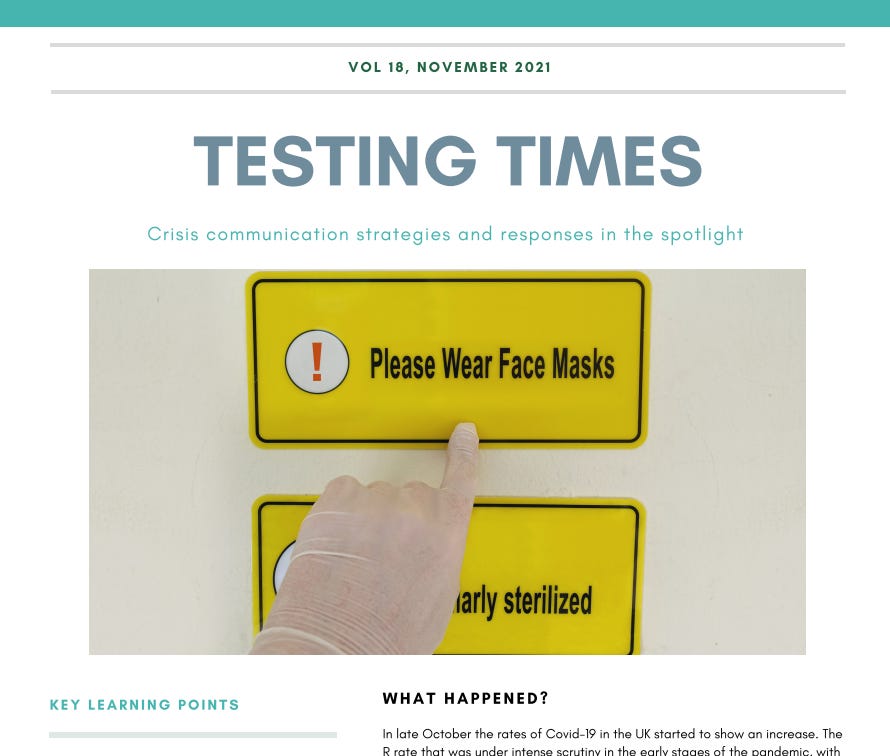Putting the blinkers on
There seems to have been a number of cases where issues, problems and crises are emerging but those at the centre of it are putting the blinkers on. Failing to recognise and accept that something is going wrong is the first problem in developing an effective response.
Yorkshire Cricket Club have shown how an organisation can become blinkered and lack awareness of the situation developing around them. I spoke to ITV Calendar about the situation at the end of last week. On Monday we saw them try to start turning things around with the new Chairman talking about the action that was going to be taken. It will be interesting to see what happens in the weeks ahead and how they turn around the damage to their reputation, recover the lost sponsors and regain the chance to hold test matches.
In the UK there was a U-turn by the Government who had attempted to change the way the system that monitors and investigates standards operates. It followed one case of an MP who was due to face a suspension over inappropriate lobbying arrangements. But while the situation developed those involved were slow to recognise the impact it would have until the widespread criticism happened.
In another problem the UK Government saw one of the top scientists who has advised on tackling Covid-19 resign. Sir Jeremy Farrar, director of the Wellcome Trust, quit the Scientific Advisory Group for Emergencies (SAGE) at the end of October. He said the pandemic was far from over and wanted to see a different approach to the situation from the Government. The surprise in this situation was the statements from the Government defending the current position but failing to acknowledge Sir Jeremy in any way. Again, it appeared to be an oversight that may or may not have been deliberate.
What we can take away from all these situations is to pay close attention to problems, issues and incidents that emerge or that we can foresee. Get plans in place and make sure you recognise quickly that something is happening and put action in place without delay. Read more on this in my recent blog.
Reporting Terror latest report
Following a recent look at ways to improve the reporting of terrorism, the Survivors Against Terror (SAT) group have published a report with recommendations for journalists. The details are important and provide an insight for PR and communication officers about elements to consider when they may be called to develop communication around terrorism. The A Second Trauma report has been challenged by some journalists. Read more about what it may mean to communicators on my latest blog.
Managing Events
There is a huge challenge for people who are running events. After a break due to the Covid-19 pandemic they are now faced with a whole range of new considerations. However, all the careful planning around risks are still required. The Astroworld incident in America is horrific and tragic but has also put a spotlight on how organisers plan events now in a post-pandemic world. It is a subject I have been discussing with an event expert in the past year. The investigation into what happened at Astroworld looks set to be complex but will be essential to consider for anyone running events whether large or small.
If you need help to review your crisis communication plans for an event, or events, you are managing get in touch at amanda@amandacolemancomms.co.uk
Testing Times
The latest edition of my monthly crisis communication case study is available. The November edition is looking at the UK Government’s winter Covid-19 plans and what we can learn from the approach. More information here.
Christmas Plans
It is that time of year when we start to look at the festive period. As well as the opportunity for some much needed relaxation there is still a requirement to ensure issues, problems and crises can be dealt with. If you are considering how to cover the festive period, or what help is available then get in touch to discuss how I may be able to help. Email me at amanda@amandacolemancomms.co.uk
In Brief:
Research has looked at the effectiveness of war metaphors in the Italian Government response to Covid-19. Vincenzo Galasso of Bocconi University, and its BAFFI CAREFIN, IGIER, CESIfo & CEPR research centers, and Carlotta Varriale of the Bocconi Department of Social and Political Sciences have conducted the study "The Effectiveness of Leaders' Public Communication During COVID-19,". Find out more here.
The CIPR and IOIC have published a guide looking at how to communicate suicide. Find out what is included here.
A special webinar is being developed by me for 7 December working with SoCrowd looking at ‘heroes and villains’. More details in the next edition of Under Pressure.
Kogan Page have sold the rights to my book Crisis Communication Strategies to allow it to be translated into Ukranian. This follows the rights being sold for a Chinese translation. If you want to find out more about the book click here.
Diary Dates:
16 November - Amanda is running two different webinars on behalf of the PRCA. The first looks at developing engaging content for public sector communicators, the second focuses on how to maximise a small or non-existent communication budget. To find out more about engaging content click here and for maximising budget click here.
Amanda is running a new course for the PRCA on 11 January 2022. The half day workshop will focus on making better decisions under pressure. It will look at practical tips and techniques for making sure you can keep calm and manage the situations you face. Find out more here.
Amanda will be speaking at the Fire and Rescue Communicators (FirePro) conference on Wednesday 24 November. The focus will be on her crisis communication top 10 key points from more than two decades dealing with crises.
Finally, don’t forget that Saturday 13 November is World Kindness Day. If everyone could do one random act of kindness it could make it a really positive experience.




